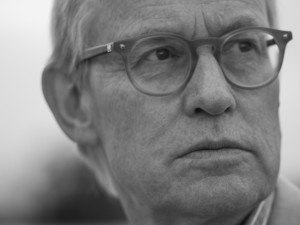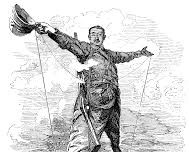18 June 2020
Want to Combat Racism?
Reform the history curriculum!
By Richard Rhodes Pooley

Eagle-eyed, regular readers of this column will have noticed that the editors have added my middle name to my byline this week. My dear, long-dead mother was convinced that Cecil Rhodes was an ancestor but never showed me any evidence. I am a direct descendant of a Tadcaster vicar called William Rhodes, born in 1762, and it’s been family tradition since the death of his daughter in 1861 to have one member of each generation given Rhodes as a middle name. But of Cecil there is no sign on the family tree. I couldn’t have been descended from him anyway. The repellent, power-mad British imperialist almost certainly died a virgin. He loathed women and appears to have been asexual. So, why was my mother so keen to link me to him? Because she had been taught history at a British school, St George’s School, Ascot*, in the early 1930s. Even when living in Zambia in the late 1960s, the wife of a British diplomat tasked with dealing with the rebel, White-ruled state of Rhodesia to the south, she could not bring herself to believe that the founder of Rhodesia was not a “great man”. Flawed, yes. Racialist, certainly (“racist” did not seem to exist in those days) but, she would argue, “our ancestor” had helped turn South Africa and Rhodesia into the two most prosperous countries in all Africa.
I learned a little bit of US American history during three years at an American school in Caracas, Venezuela, in the late 1950s. But the history I learned throughout the 1960s at various schools in England was that of England and Europe through the centuries. The Scots and Welsh were bit-part players in the story. The Irish were ignored until they became troublesome and “the Irish Question” was dealt with in the last paragraph of each chapter. The acquisition of an empire also felt like an afterthought but was generally thought to be “a good thing”. There were times when “1066 and All That”, Sellar and Yeatman’s superb 1930 parody of the 1905 “Our Island Story”, seemed to be the official history textbook in British schools.
It wasn’t until I was a Voluntary Service Overseas teacher in a junior secondary school on the edge of the Kalahari Desert in Botswana in 1970 -71 that I learned the truth about “my ancestor”, Cecil. In the first term I was forced to use the history textbook published when Botswana was still the Bechuanaland Protectorate. Ostensibly ruled by the British, its capital, Mafikeng, was in apartheid South Africa. The textbook began with the briefest of histories of Europe – from Ancient Greece to the 19th Century. Most of the book covered the colonisation of southern Africa by Europeans, and the wars fought either with each other or between them and the “Bantu-speaking people”. Bechuanaland and its Batswana and Bushmen/San peoples got, I think, a couple of mentions. I would be teaching stuff I had only absorbed myself a few hours earlier. I was made to look a fool many times. For example: “Teacher, why is it saying that this Portugal man discovered the Cape of Good Hope? The Hottentots were living that side already for long time.” Happily, the history curriculum and textbook changed from the second term. My pupils (and I) learned about the Ancient Egyptians, about huge, prosperous kingdoms in medieval west Africa and the thriving coastal cities of early modern east Africa, and about the ancient and still independent Ethiopian empire. No longer must the builders of Great Zimbabwe have been early white explorers because the local black people simply could not have had the skills. But the history of southern Africa was still essentially the story of the Europeans bringing education, economic development and culture to the Bantu-speaking tribes who had migrated into the area from the north just as the Europeans were arriving on the southern coast. My pupils accepted this without question. They had School Certificate to pass and a civil service desk to reach.
I went back to that school in November 2016. I asked a young Motswana history teacher what history he taught. He was keener to talk about the consequences of Trump’s election victory but did tell me that much of the curriculum focused on “what you people did to us.” I don’t think he meant the civilising of Africa by Europeans.
Roll forward twenty years from 1971 and I found myself having to deal with the consequences of the lacunae and subjectivity of another country’s history curriculum, that of Japan. I was running my British training company’s Tokyo subsidiary. A Japanese manager at Sony’s head office, a keen amateur historian and an admirer of the way the British had managed their empire, asked me to help him solve a problem Sony were facing as they began building a presence in China. His hobby had revealed to him how little he had been taught at school about Japan’s role in the Second World War – “the Pacific War” as it is called in Japan. He showed me the official history textbook he had had at school and which remained much the same in the 1990s. The Japanese text on the Pacific War barely filled a single page. Sony’s problem? They were sending Japanese staff out to run newly-built factories in China who had no idea of the hatred felt by their Chinese subordinates towards them. Ikeda-san (not his real name) was blunt. No Japanese trainer of these assignees would tell the truth about their countrymen’s appalling treatment of the Chinese during the war, either because they did not know of it themselves or because it was too shameful (or, as he admitted, they simply did not believe it to be true). Only foreign, ideally British, trainers could do this and be believed by Sony’s managers. Whether Ikeda-san knew that high up on the list of those people whom Chinese children are taught at school to mistrust are the British (know about the Opium Wars, dear British reader?), I never discovered. No matter, it was good business for my company.
No country can have an “objective” history curriculum. One people’s view of a single event in their history will usually be quite different from that of another people involved in the same event. Look, for example, at how differently the story of the evacuation of British and allied troops from the beaches of Dunkirk in 1940 is taught to British and French children in 2020. I referred to this in January 2018 – https://shawsheet.com/article/you-took-part-too/.
Nor can one be sure that any history taught at school will actually be accepted or understood by children taught something else by their families. During the early 1950s social scientists in India conducted a country-wide survey of villagers to ascertain how many of them knew that British rule had ended in 1947. The poll was stopped when the scientists discovered that most interviewees didn’t know the British had ever been in India.
My son, Thomas, now 30 (and burdened by his father with the middle name Rhodes), studied history at Leeds University. His dissertation on the role of Subhas Chandra Bose and the Japanese-backed Indian National Army during World War Two brought home to him how little useful history he, his sister and his friends had been taught in their English school. Learning about the Tudors and the Nazis was far too narrow a curriculum to enable him to make sense of today’s world. He now shares a house in London with three others, one of whom is Irish. What he has learned from this man about Irish history has transformed his understanding of the current politics of Northern Ireland. The toppling of slaver Edward Colston’s statue in Bristol has made him ask why he was not taught at school about the British role in both the Atlantic Slave Trade and the Anti-Slavery movement.
There are calls from many anti-racist activists for more space in history books and lessons to be given to examples of successful endeavour by black people (and other oppressed minorities) in British history. This is wrong-headed. There are, in truth, few such success stories. Trying to pretend there were will only reinforce white British people’s view of their racial superiority and not make them face up to the prejudice, discrimination and worse which made these success stories so rare. We need to have a broad-based history curriculum which teaches our children about the sources of today’s thorniest problems both in the UK and abroad.
Back to “my ancestor”, Cecil. His surname did once prove useful. At the end of my time in Botswana, my fellow VSO and I travelled to and from northern Tanzania, a round trip of over seven thousand kilometres, most of which we hitch-hiked. The first part though was by train from Gaborone, the new capital of Botswana, to Victoria Falls in north-west Rhodesia. When we crossed the border into Rhodesia at Plumtree a young white customs officer, dressed in khaki shorts, white shirt and white socks, asked for our passports. On seeing my middle name, his face lit up: “Are you a relation of Cecil Rhodes?” “Certainly am,” I lied. Then I told him the bad news. “We are travelling to Kilimanjaro in Tanzania. If you stamp our passports, the Zambians won’t allow us to cross the border at Vic Falls. I’d be really grateful if you would stamp these bits of cardboard instead. Really sorry.” We had come prepared with bits of card cut from a Cornflakes packet. After telling us how stupid “those Communist munts up north” were, he stamped the bits of card. Which is why my passport for that trip shows me to have left Botswana on one day and miraculously arrived five hundred kilometres away in Zambia two days later without ever stepping foot inside the country founded by “my ancestor”.
*Another imperialist, but a man still deserving of statuary, attended St George’s when it was a boy’s school. His name was Winston Churchill.


